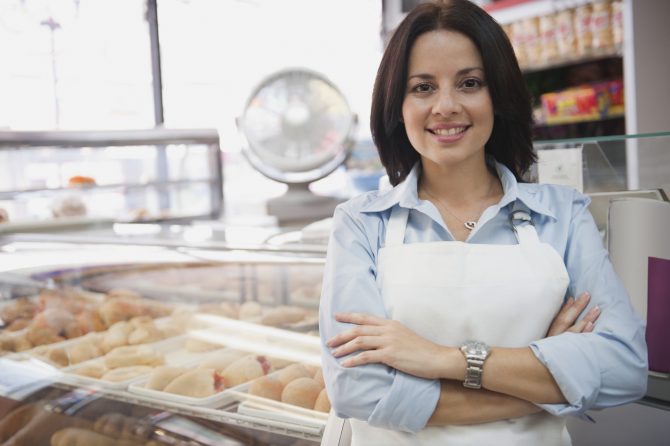Guest Post from Emma Jones, founder of UK-based Enterprise Nation
Traditional independent businesses that don’t regard themselves as having relevance in the digital world are finding growth by getting online.
In the UK, an astonishing 50% of small firms are still not online. Enterprise Nation’s Go and Grow Online campaign, supported by Verisign, Microsoft and BT Business, has launched a 12-month programme of nationwide events to help the smallest firms get the skills and confidence to get their digital ducks in a row. Of course, small businesses can survive without a website, a Facebook page and a Twitter account – but how much could they grow if they took the plunge into cyberspace?
We’ve taken a look at three very British trades made famous by an ancient nursery rhyme – “Rub-a-dub-dub, three men in a tub” – that are increasing their trade and geographical reach simply via getting online, in addition to the traditional presence at a market stall or retail shop. And who do you think they are? A butcher, a baker, and a candlestick maker…
The Butcher
Charlotte’s Butchery in Gosforth in Newcastle upon Tyne, is picking up 40% of its offline business via its online efforts. In founder Charlotte Harbottle’s case, it’s from a blog at Charlotte’s Butchery, where she waxes lyrical about cuts of meat and the very business of being a female butcher.
The 26-year-old’s blog includes contact details, offers and company updates; it is completely free to run and easy to design and maintain. It’s all about the effort.
She told The Sunday Times recently: “It costs nothing and it brings in 40 per cent of sales. It doesn’t make sense not to have your business online, especially when it’s free.”
“People worry about the costs and the time it takes to keep on top of online updates, but I wouldn’t be in this position if I didn’t have a presence on the internet.”
The Baker
When former journalist Elisabeth Mahoney set up her home-based bakery in her kitchen in Cardiff, Wales, she knew she needed a digital shop window to get her business off the ground. She bakes and delivers bread and soups to homes within a one mile radius of her home via an online subscription, as well as running cookery classes. Her first order came in 10 seconds after she launched it via Facebook and Twitter.
Elisabeth said: “When I decided to launch the OneMileBakery.com, it was always envisioned as an online-only business. This was partly to minimise investment and risk – I devised the business model in the depths of the economic downturn, so taking on premises for my first business seemed like a far leap. A simple website was affordable, and also positions the business as something different in the traditional sector of bakery. Being online only, having my website as my shop window, and using social media to market and grow the brand, all mirrored the fact I would sell my products differently: with a subscription-only model, and delivered by bike to customers only within a mile of my Cardiff home.
“A few people advised against this, and suggested something like a market stall would work better so people could sample my products and meet me in person. But I knew that this model would appeal to me, and many people like me: I engage with online brands, especially in the food sector, and admire the ones that really connect with consumers that way.
“My plans for future expansion later this year will all launch and remain online only: I love the reach of well-marketed online businesses and the power of social media to take a hyper-local micro business out to a huge potential audience. It has certainly allowed me to think big about what began as a tiny home-based business.”
The Candlestick Maker
Meanwhile, candlestick maker Helen Smith, who runs EcoAntiqueTeacupCandles.com from her home in Walthamstow, London, says although her website only brings in one in 10 sales, it’s still an invaluable tool to keep in touch with customers.
She said: “Although only about 10% of my sales are through my e-commerce website it is absolutely an essential part of my business. I ran my business for a while before I developed my e-commerce site – but I always had a one page site telling my customers where I was going to be trading – in a pop-up store or a show, market, or fair.
“This is still the most visited page on my website to this day. The majority of my customers do like to come and see me in person – to discuss the history of my pieces in depth or be introduced to different periods and styles, and also to try the different scents of the candles first hand.
“However the website is essential for informing customers both about me and my product and also as an introduction to those people who receive my candles as gifts. Only last Wednesday I had a call via an online search engine by a party organiser who needed 18 teacup candles for the weekend.”
Getting Online
These three small businesses all benefitted hugely from going online, and although they are based in Britain, Elisabeth and Helen chose a .com domain to do so. The most recognised domain on the planet, a .com represents an ideal way for small businesses to take their first steps online. These successes are why we’ve launched the Go and Grow Online campaign and as we hopefully inspire business owners to take that first step into the digital world, I’m sure we’ll be able to share more stories such as theirs. Though perhaps not all will be from those immortalised in beloved nursery rhymes!
Emma Jones is founder of Enterprise Nation. For more information, visit www.enterprisenation.com.



